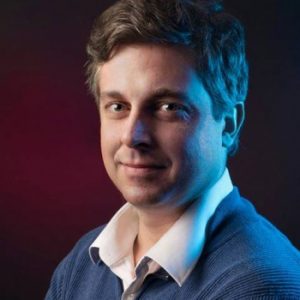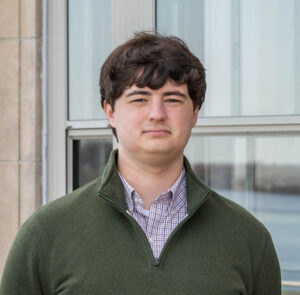
The department of physics is pleased to announce that Prof. Kevin Black has been named new department chair. His three-year term began July 1, 2024, succeeding Prof. Mark Eriksson. Black says he is looking to continue the department’s excellence in its mission of research, teaching, and outreach, and to continue developing an intentional commitment to diversity.
“Under Prof. Eriksson’s leadership, our department has attained near-record highs of faculty members as well as graduate and undergraduate students, which will lead to significant successes in our research program,” Black says. “Now, we need to continue to focus on making a commitment to diversity an active component of what we do as a department.”
Two pillars of the department’s mission have always been research and teaching, and Black wants to sustain successes in those areas. He begins his term with over a dozen faculty members who have joined the department in the previous three years, bringing the total number of professors to 56. These faculty members represent a range of seniority levels and a breadth of research fields. He also begins at a time when more students than ever are being taught in department courses.
“Research and education are the core values of a research university,” Black says. “We want to do excellent, cutting-edge research and we want to teach the next generation of scientists.”
Black’s focus on diversity and climate efforts represents a continuing effort from leadership before him. The need to add diversity as a pillar of the department’s mission became evident to him when he saw the list of department chairs who came before him, and he noted that he was the 33rd white male chair out of 35. He acknowledges the challenge that the broader field of physics faces, and specifically at UW–Madison: both lack adequate representation of students from marginalized groups.
“We need to improve diversity at all levels in this department,” Black says. “There’s no magic wand. It takes a concerted, sustained effort and we need to make it a priority going forward.”
Lastly, Black also believes that the department’s commitment to educational outreach is critical to fulfilling the Wisconsin Idea, the idea that education should influence people’s lives beyond the boundaries of the university. The department has a long-standing tradition of engaging in outreach, including over 100 years of running the Physics Museum and over four decades of running The Wonders of Physics outreach program.
“Physics outreach can inspire the next generation to think about the natural universe and think about how things work,” Black says. “In a world which is increasingly driven by soundbites and nonsense on the internet, it’s crucial to encourage and guide young students to think rationally about science and formulate questions and opinions.”
Black joined the faculty as a full professor in 2018 and works with the high energy experiment group on the Compact Muon Solenoid (CMS) experiment at CERN. He had previously been a professor at Boston University. Black earned a bachelor’s degree at Wesleyan University where he worked in an atomic physics lab. He has a doctorate in physics from Boston University, and much of his thesis work was completed on the Tevatron at Fermilab. He was then a postdoc and research scientist at Harvard University, where his work transitioned to the Large Hadron Collider at CERN.
